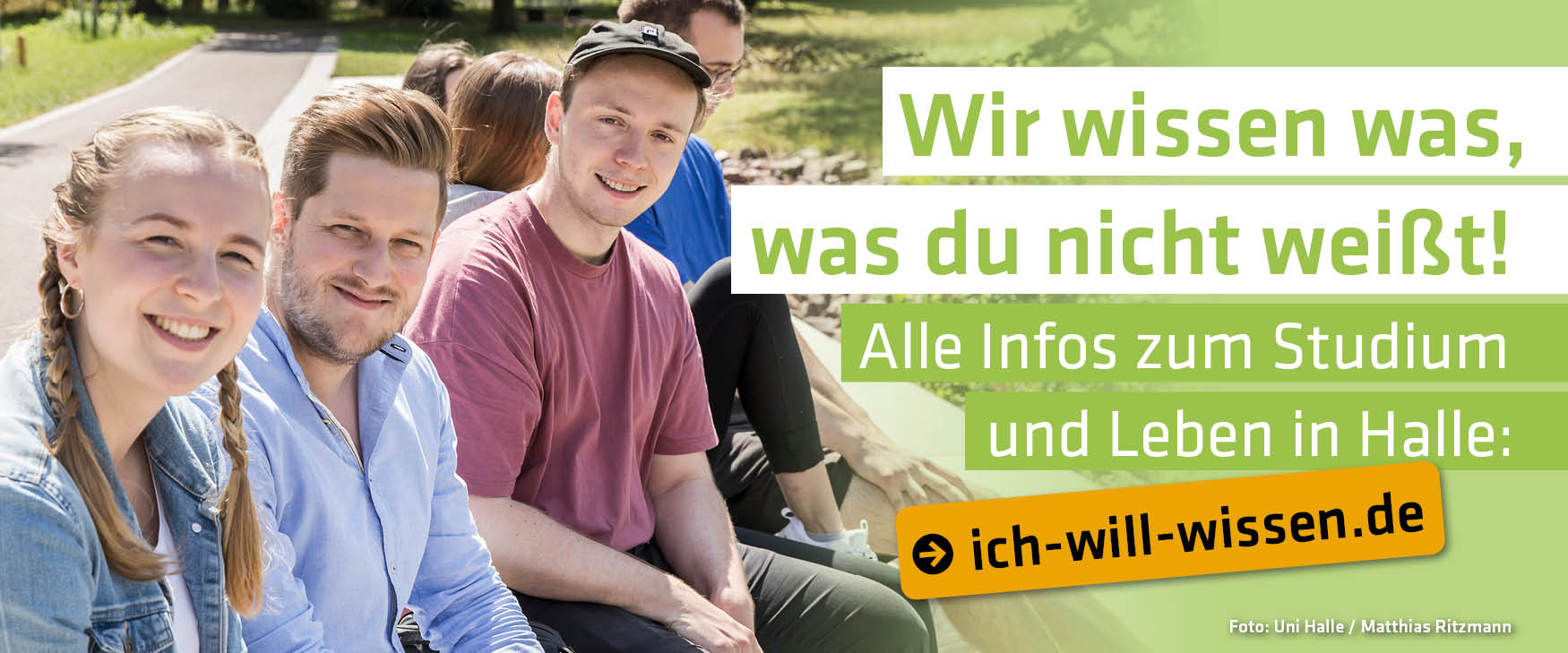Angewandte Geowissenschaften (Applied Geosciences) Master's study programme
General Information
| Degree | Master of Science (M.Sc.) |
|---|---|
| Credit points | 120 CP |
| Standard period of study | 4 semesters |
| Start of studies | Winter semester only |
| Form of study | Classroom teaching, Full-time studies |
| Medium of instruction | English and German |
| Admission | not restricted (no NC) |
| Specific admission requirements | yes (Details) |
| Faculty |
Naturwissenschaftliche Fakultät III – Agrar- und Ernährungswissenschaften, Geowissenschaften und Informatik |
| Institute |
Institut für Geowissenschaften und Geographie |
| Accreditation | accredited |
Programme Objectives
The aim of the bilingual, consecutive master’s programme in Angewandte Geowissenschaften (Applied Geosciences) (hereinafter Applied Geosciences) is to provide in-depth knowledge in the geosciences. The understanding of the processes in the Earth's interior and on the Earth's surface is furthered using scientific methods; the spatio-temporal dynamics of the Earth System are studied and investigated in a comprehensive and holistic manner. The training in methods and techniques for independent, responsible work in the following selectable subjects areas is of fundamental importance and skills in these subjects will be trained and developed:
-
Geodynamics (research on the deformation and rheology of geomaterials, basic geoscientific research and provision of geoscientific data for society, assessment of geohazards)
-
Applied Geology (quantitative and qualitative hydrogeology, near-surface and deep geothermal energy, basic principles of engineering geology)
-
Technical Mineralogy, Geochemistry (apparative synthesis and analysis of natural and anthropogenically produced geomaterials, treatment, recycling and disposal of mineral residues, CO₂ storage, characterisation of the properties of amorphous and crystalline materials)
-
Sedimentary systems and resources (sediment dynamics of fluvial, coastal and shallow marine systems in modern environments and geological records; integration of sedimentological techniques in the field and in the laboratory, use of UAV and LiDAR to create digital outcrop and terrain models)
Study in Halle!
Study in Halle because ...
-
the contact between teachers and students is very good and we promote a positive learning environment.
-
the courses are very varied with seminars, exercises, laboratory experiments and field work.
-
the lecture halls and seminar rooms in our building have upscale technical equipment.
-
our students find a branch library in the department, which is characterized by a very good availability of the required literature, a high topicality of the stock, good access to electronic journals and books as well as an individual support of the users.
-
selected rocks are displayed in the Geological Garden of the Institute, which provides an idea of the diversity of rock types in Germany.
- we have one of only about 40 coordination offices for sustainability at universities in Europe. We are committed to the sustainable design of research and teaching.
Career Opportunities
The MSc Applied Geosciences qualifies for complex geoscientific activities and tasks in science, industry and business. The objective is to train broadly based specialists who can guide future-oriented search for and use of natural geological resources.
The profile of the study programme qualifies for the following research and professional fields: University and research institutions, scientific and economic service sector on a national and international level (public offices and authorities, industrial companies, geoscience consulting, mineral resource companies, insurance companies, energy companies). It also qualifies for PhD positions.
Accreditation
The MSc Applied Geosciences is accredited. For more information, please visit the website of the Accreditation Council.
Programme Structure
-
The study programme is structured as follows:
- Modules of the programme (90 CP)
- Master's thesis (30 CP)
Modules
| Modules | CP | rec. sem. |
|---|---|---|
| Compulsory module (30 CP) | ||
| Master's thesis | 30 | 4 |
|
Elective modules (90 CP) 15 CP of the elective modules are not included in the calculation of the overall grade of the study programme. |
||
|
Elective modules: Geosciences (Geodynamics, Technical Mineralogy, Petrology and Exploration Geology, Applied Geosciences) |
||
| Internship Master | 10 | 1, 2 or 3 |
| Orientation module: overview of research activities in applied geosciences | 5 | 1 |
| Geodynamics | ||
| Mapping and Crustal Balancing | 5 | 2 |
| Structural Analysis | 5 | 1 and 2 |
| Deformation and Rheology | 5 | 1 or 3 |
| Tectonics of Mountain Building | 5 | 1 and 2 |
| Geochronology | 5 | 1 or 3 |
| Geodynamics Seminar | 5 | 1, 2 or 3 |
| Technical Mineralogy | ||
| Applied and Technical Mineralogy I | 5 | 1 |
| Applied and Technical Mineralogy II | 5 | 2 |
| Advanced Methods for the Characterization of Minerals | 5 | 1 |
| Project Management in Applied and Technical Mineralogy | 5 | 3 |
| Advanced Laboratory Exercises in Applied and Technical Mineralogy | 5 | 3 |
| Advanced Exercises in Applied and Environmental Mineralogy | 5 | 3 |
| Quantitative Mineral Analysis by XRD (Rietveld-Method) | 5 | 1, 2 or 3 |
| Petrology and Exploration Geology | ||
| Conceptual and empirical approaches to metallogeny of ore deposits | 5 | 1 |
| Magmatic and hydrothermal metallogenetic processes | 5 | 1 |
| Remote Sensing in mineral exploration | 5 | 3 |
| Advanced analytical methods of mineral deposit research | 5 | 2 |
| Mineral characterisation for ore processing techniques | 5 | 2 or 3 |
| Applied Geology | ||
| Water management | 5 | 2 |
| Engineering Geology | 5 | 2 |
| Geothermal Energy | 5 | 1 or 3 |
| Hydrogeochemical processes in groundwater and hydrothermal fluids | 5 | 1 or 3 |
| Hydrogeology | 5 | 1 or 3 |
| Groundwater Management | 5 | 1 or 3 |
| Numerical groundwater modelling | 5 | 2 |
| Project management in applied geology | 5 | 2 |
| Special mathematics for geoscientists | 5 | 1 or 3 |
| Elective modules: Subsidiary subjects (0-20CP) | ||
| Soils under warm and cold climate | 5 | 3 |
| Land System Science 1: Global Environmental Change | 5 | 1 or 3 |
| Land System Science 2: Climate and Ecosystems | 5 | 1 or 3 |
|
Geschäftsprozessmanagement |
5 | 1 or 3 |
| Spektroskopische Methoden | 5 | 2 |
| Analytische Chemie im Nebenfach | 5 | 1 or 3 |
| Umweltchemie | 5 | 1 |
| Umweltökonomik | 5 | 1 or 3 |
| Additional elective modules (0-10 LP) | ||
| Elective module 1 | 5 | 1, 2 or 3 |
| Elective module 2 | 5 | 1, 2 or 3 |
> PDF version of this table in German
The content, learning objectives, workload, requirements and prerequisites of specific modules are published in the module catalogue (German version) and the study and examination regulations (in German only).
English versions available upon request. Please contact the Geo Study Office: studienbuero@geo.uni-halle.de
Admission Requirements
***Note: The contents may be subject to change.***
Applicants for the MSc Applied Geosciences must
-
hold a bachelor's degree or equivalent degree in geosciences or comparable field with a minimum grade of 2.8 or better according to the German academic grading scale and
- prove good knowledge of written and spoken English.
A study programme is comparable if
-
at least 20 ECTS have been obtained in foundation courses in mathematics, physics, chemistry and
-
at least 60 ECTS have been obtained in basic courses in geology and mineralogy, including geological field experience.
Decisions on comparability are made by the examination board on the basis of the transcript of records submitted.
Applicants must prove their English language proficiency by submitting either TOEFL, IELTS, Cambridge Certificate, Unicert II, German Abitur or an equivalent internationally recognised language certificate attesting level B2 according to the Common European Framework of Reference for Languages (CEFR). However, proof of language proficiency is not required if the first degree was obtained in a study programme taught in English.
Important note: The MSc Applied Geosciences is a bilingual study programme (English/German). Therefore, international applicants must additionally prove their German language proficiency for studies. For more detailed information on German language requirements for university, see here.
Admission to the study programme may be subject to conditions. In case of deficits in the undergraduate programme, you may be obliged to catch up on a maximum of 2 modules of the B.Sc. Angewandte Geowissenschaften (Applied Geosciences) (in German) before registering for the master’s thesis. However, the additional workload resulting from the imposed bachelor's modules is not part of the master's programme.
This chapter consists of excerpts roughly translated into English. Only the study and examination regulations are legally binding.
For information in German, see here.
Application
***Note: The contents may be subject to change.***
The admission to the MSc Applied Geosciences is currently not restricted (no NC).
-
Applicants with a German bachelor’s degree (or equivalent) please apply via www.uni-halle.de/bewerben by 31 August.
- Applicants with a bachelor's degree (or equivalent) from abroad please apply via www.uni-assist.de by 15 June. > Information and Application procedure
Halle University reconsiders its admission policy every winter semester and determines whether admission to a study programme is restricted (Uni-NC) or free (no NC). From May each year, the current decision is published here (see also General Information).
Required documents
The following documents must be submitted with the online application:
-
Proof of your bachelor's degree or equivalent (i.e., graduation certificate and transcripts). Important note: Applicants via uni-assist upload their certificates and transcripts both in original language and official translations, unless the originals are in English or in German.
-
Halle University does accept provisional graduation certificates, if your degree is scheduled after the application deadline. Please submit your transcripts indicating minimum 2/3 of your total credits to be passed / your senior student stage, accordingly. The final graduation certificate shall be submitted with enrolment, respectively by no later than 31 January in the year following admission.
-
Proof of English language proficiency (see admission requirements)
- Language certificate attesting German language proficiency for university studies (see admission requirements)
This chapter consists of excerpts roughly translated into English. Only the study and examination regulations are legally binding.
Information for international applicants
For any questions regarding application and admission - except eligibility - please see website or contact the Student Registration Office - International Students Section.
Programme Advisor
For detailed information concerning the contents, objectives and structure of the programme, please contact the programme advisor.
Dr. Rüdiger Kilian
Institut für Geowissenschaften und Geographie
Von-Seckendorff-Platz 3
Room: H3 1.25
06120
Halle (Saale)
Phone: +49 345 55-26164 Email: ruediger.kilian@geo.uni-halle.de









